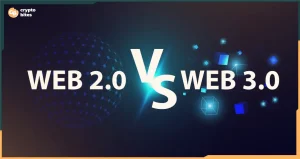
A Beginner’s Guide to Blockchain Technology in the Banking Sector
Blockchain in the banking sector is not a choice anymore – it’s a necessity.
Why? The benefits are substantial: lower costs, faster processing speeds, secure transactions. Moreover, it’s not a passing trend. The global market for blockchain in banking is predicted to soar to $8.7 billion by 2030.
So, how exactly is it reshaping the banking sector?
The Revolutionary Role of Blockchain in Banking
Before we dive into its role in the banking sector, let’s first understand what blockchain is. A blockchain is a digital ledger. It records transactions on a network of computers. Think of it like a closet space that stores transaction logs. Within the closet are blocks and chains. Each block is a separate transaction, and the chain links them together.
It’s like a database in that sense. But that’s where the similarities end. A blockchain is decentralized. This means that no single entity has control over it. Blockchain in the banking sector improves transparency, better security, and streamlined operation. Some of the leading banks that have implemented blockchain technology include:
1. Goldman Sachs
A leading investor behind the stablecoin USDC that backs a cryptocurrency with the US dollar. The value of the USDC remains what the US dollar is worth. It is (almost) immune to the changes in the crypto markets. It uses crypto to move large sums of money worldwide. This helps them process transactions within seconds.
2. J.P. Morgan
An active player when it comes to using blockchain. It uses the tech to help improve money transfers. Their solution is based on Onyx’s blockchain platform. It enables banks and users to make data transfers with greater speed and control. This allows them to address challenges that would have led to higher costs and delays.
3. Swedish Central Bank
They have created their own digital currency called eKrona. It uses the Corda distributed ledger. The ledger was developed by R3. The project was a result of the declining use of cash in the nation. Now, Sweden may become completely cashless in the coming decades. Other countries have also expressed the need and importance of having a digital currency.
Smart Contracts In Banking
Smart contracts in banking are coded blockchain applications. They function based on pre-programmed conditions. These conditions serve as controlling principles of each transaction. Banks like the Bank of America and Standard Chartered are actively experimenting with smart contracts in banking. This helps them automate the change of ownership and payment processing.
Benefits of Blockchain In The Banking Sector
The benefits of blockchain in banking are many, and it’s helping institutions transform transactions worldwide, including:
1. Better Transparency
All transactions made on a blockchain are recorded in blocks. These blocks are then placed on a network where they are linked with others. In addition, the blockchain can only be accessed by those who have permission.
Since these records can be easily monitored, they help improve the overall transparency of transfer. This allows the banks to track and trace any transaction with ease. It helps them know where the money came from and where it’s going.
2. Fraud Reduction
Fraud reduction is one of the most desirable benefits of blockchain in the banking sector. Each block within a blockchain is for a single translation. It is unique and cannot be replicated. This helps reduce the risk of fraud in money transfers.
But that’s not all. Each financial transaction using a blockchain can be completed within seconds. This tech assists banks in reducing risks like data being captured or stolen by third parties. It also helps reduce threats of potential payment diversions.
3. Simplified Operations
Blockchain tech helps enable quick transactions. They remove third parties or intermediaries from the money transfer process. This means that one user is able to transfer funds directly to another. It’s what helps the banks ensure quick and seamless services.
It also takes out the needless steps required for payment processing and transfer. All of this leads to reduced costs. It also makes processing payments much faster. This then allows the banks to streamline their operations with ease.
4. Improved Customer Experience
Another one of the benefits of using blockchain in the banking sector is that it improves customer experience. Customers, regardless of the purpose of a money transfer, don’t like to wait. They want it all within seconds. Blockchain is just what the doctor has ordered for such demands.
Unlike traditional banking, blockchain technology can function regardless of the time. This means that a user can make banking transactions whenever they want. This frees customers from the constraints of traditional banking hours. It also improves the overall experience they have when making a transaction.
Risks and Challenges of Implementing Blockchain in Banking
Before implementing blockchain in the banking sector, it’s crucial to know that the use of this tech can sometimes come with certain risks and challenges. They include:
1. Legality
Crypto is subject to many legal rules like Know Your Customer (KYC) and Anti-Money Laundering (AML) all over the world. Also, some countries have even banned crypto. For example, blockchain banking won’t be possible in countries like Nepal or Morocco. As per their laws, crypto is illegal there.
2. Scaling
In a blockchain, nodes are used to store and execute activities that validate money transfers. For example, in the banking sector, financial intuitions process loads of money transfers daily. This means lots and lots of verification. It may cause the network to be exhausted, which can keep a bank from using the tech at scale.
3. Privacy
Blockchain is known for its transparency. Any user who has access to it can view the money transfer records. However, such access can raise privacy and security concerns. For example, the bank staff may have access to the network. They can be used to view daily activities. But this may leave sensitive information exposed as well.
4. Usage
The tech is still under rapid development. This means that many people may not know it all that well. It can create usage problems. For example, using a new system that employees are not familiar with may lead to poor installation, an increase in costs, and an environment that’s not ready to accept change.
Blockchain Use Cases in Banking
Blockchain and decentralized finance (DeFi) are making waves in the banking sector. These innovative technologies are growing in use and application – transforming the industry like never before. Some banks are using it to ensure faster money transfers and better operations. Others are using it to make sure that asset-backed digital tokens in banking are available. Some banks that are quickly catching on to the use of blockchain include:
1. Ally Bank, United States
Ally Bank is a financial institution in the United States (US) that facilitates investing in cryptocurrencies. Although the bank doesn’t offer cryptocurrency trading, it can provide indirect investment exposure to crypto-specific trusts, exchange-traded funds (EFTs), and crypto stocks.
2. Fidor Bank, Germany
Fidor Bank is a banking organization in Germany that is facilitating digital payment. The bank helps businesses realize their full potential by utilizing innovative payment solutions. In addition, it also facilitates crypto-based peer-to-peer trading and was the first European bank to be directly involved with crypto and the blockchain industry.
3. BankProv, United States
BankProv is a blockchain-based banking platform for cryptocurrencies. It allows crypto businesses to use the ProvXchange network for making client-to-client transactions. In addition, it also provides businesses with fully-insured USD deposits, a complete API banking suite, and a range of payment solutions.
The Future of Blockchain In The Banking Sector
The future of blockchain is very promising. But, many challenges like legal issues and privacy concerns may limit its progress. As of now, blockchain technology in banking operations is growing very fast. But its use in the banking sector needs to be scaled. To do this, legal clarity about the use of blockchain is needed.
Lawmakers need to know that a decentralized system for money transfers has now become a necessity. It can reduce costs, make transfers quicker, and do much more. Today, blockchain in banking is limited by computing power. But, progress in the area is being made, and the rapid use of such technology is expected.
Also, people need to be made aware of the use of blockchain. Bank staff must be trained about installing the tech and using it. This will help them learn more about blockchain. It will also allow them to make better use of the tech for daily tasks. We may see that in the future, crypto is legal all over the world. It may even lead to every country having its own crypto that’s backed by its central banks.
Key Takeaways
Driven by the inexorable forces of technology and shifting customer demands, the future of the banking industry hangs in the balance. Customers want faster processing, and banks are using technology to meet this demand.
Many banks all over the world have now started to use blockchain and crypto. It has helped them make money transfers more transparent, quick, and secure.
Blockchain is a core component of the banking industry. It has and continues to help banks improve their operations and customer experience. But it’s not all sunshine and rainbows. The use of this tech is limited by legal and technical issues. Nonetheless, awareness about its use and benefits is on the rise, and the future remains promising.




